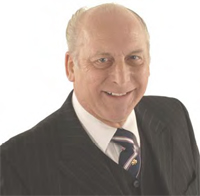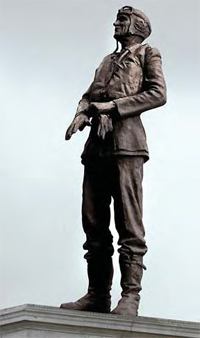|

Air Chief Marshal Sir Keith
Park...
On Wednesday 4 November, I was delighted and
honoured to accept an invitation to attend the unveiling of the
statue to Air Chief Marshal Sir Keith Park GCB, KBE, MC*,
DFC, DCL, MA, RAF on the fourth plinth in Trafalgar Square, in
six months time to be replaced with a permanent statue in Waterloo
Place.
Many of you reading this will be asking who is this man? He,
alongside two others, made it possible to lead the life you are now
experiencing without being under German rule, although Gordon Brown
and Tony Blair have done their utmost to reverse this situation and
put you under the rule of Brussels!
I have given Sir Keith his full title as he was a quite remarkable
man; born in 1892 in the little town of Thames on New Zealandís
North Island, he was one of ten children to Scottish-born geologist
James Park and his wife Frances. When he was 19 years old, he joined
the Union Steam Ship Company of New Zealand. This company lasted
until 1917, when it was acquired into the large shipping group of
P&O. Also in the P&O group were the New Zealand Shipping Line and
Federal Steam Ship Company, both of which I had the pleasure of
serving with for many happy years. So you start to see why I showed
added interest in this man.
Sir Keith started his military career in 1914 when he became a
gunner. In January 1915 he sailed to Egypt and fought both there and
at Anzac Cove, Gallipoli. In the same year, he gained a commission
to second lieutenant before he transferred over to the British Army.
He was serving in the Royal Horse and Field Artillery when he was
seriously injured after a shell exploded under the horse he was
riding. It was then he was graded as permanently unfit for active
service.
Not to take this as a ban from fighting for his chosen country, in
December 1916 he transferred to the Royal Flying Corps. July 1917
saw him joining 48 Squadron and flying a two-seater Bristol Fighter.
Within 9 months, he was commanding the squadron and given the rank
of Major. During his service at this time in the 1914 Ė 18 war, he
was shot down twice and awarded the Military Cross and Bar,
the Distinguished Flying Cross and a Croix de Guerre.
He also achieved the title of highest scoring ace with 20 victories
by the end of World War 1
Two weeks after his return to England in 1918, he married his wife
Dorothy. During their married life, they had two sons. One year
later, he was given a permanent RAF commission, before going on to
be one of the first to attend the newly formed Air Force Staff
College at Andover in 1922. He continued to progress up through the
ranks, being posted in numerous places both home and abroad. Then in
1937, he was promoted as aide-de-camp to King George VI for the
Coronation year.
In July 1938 he was promoted once again, this time to Air Commodore
and became deputy at Fighter Command Headquarters, Bentley Priory
near Uxbridge. His boss was Sir Hugh Dowding; he was to become the
second person named in the success of the Battle of Britain
alongside Winston Churchill. The trio, including Sir Keith, would
form and implement the Battle of |
Another batch of views from Tom that do
not necessarily reflect the views of DaC
THE WORLD ACCORDING TO TOM WHITBREAD
DaCís answer to Victor Meldrew! |

The Statue of Sir Keith
Park at Trafalgar Square - soon to be moved to Waterloo Place
Britain. Sir Keith was put in
charge of the newly introduced Spitfires and Hurricane fighters,
these fighters had the added equipment of radar and radio to be able
to coordinate aerial defence over Britain.
Then in April 1940, he was promoted again, this time to Air
Vice-Marshal in command of No 11 Group - Fighter Commandís principal
subdivision covering all of London and the South East of England. It
was Sir Keith Park who was in charge of the air cover and protection
of troops - both
English and allied - when they evacuated from Dunkirk, an operation
that returned some 340,000 troops back to England. During these
times in France, 435 aircrew were lost in action, men who were
critical in the plans for the defence of England.
This brave man was the last airman to leave France in his
hurricane, but this was typical of a man who would lead from the
front, to be up there in his fighter aircraft showing his men he
would not ask them to do what he would not do himself. I suppose you
would class him as a real life Biggles, someone who could
inspire every young man to give their last drop of blood in
defending his country.
We had the trio of Winston Churchill, giving the orders as Prime
Minister; Hugh Dowding, making sure that fighter command had the
correct resources while trying to solve the problems encountered
with the night fighting of the German bombers and Keith Park,
organising the day-to-day operations from an operations room in
Uxbridge. His experience as a working fighter pilot became
invaluable. He commanded respect with his strategic brilliance and
calm leadership, which gained Britain many successes in the air over
England. This man made split-second decisions as Hitler sent over
wave after wave of his Luftwaffe to try and batter the English into
submission. He was someone who longed to be in the middle of
whatever battle was going on, to be with his men and transferring
his inspiration and sense of adventure to them. In return, his men
would lay down their lives for him. They knew he would never stand
on ceremony when it came to sitting with his men, eating off the
same tin plates and drinking out of the same chipped tin mugs. He
was the first to slap a young airman on the back and congratulate
him for a job well done. By the same token, he would never stand for
bulls***t and would give an airman a real bo***cking if he messed up
and endangered anotherís life.
He continued through the rest of the war, being promoted to Air
Marshal and Air Officer Commander in Chief Middle East, defending
Malta and Egypt. During this time he received the honour of a Knight
Commander (KCB).
Then his attention was |
channelled into assisting
the USA with an air supply operation to support Burmaís liberation
from the Japanese; for his expertise he was awarded Commander of the
US Legion of Merit in 1945. In December 1946, he retired with the
rank of Air Chief Marshal and was awarded the Knight Grand Cross
(GCB).
Sir Keith Park died on 6 February 1975 - four years after his wife
- in his beloved New Zealand and received a full military funeral.
If we had men like this leading our country today, what a
better place it would be to live in; men who stood in the face of
danger to defend their chosen country, not hide behind a reinforced
door while lining their own pockets. Not forgetting Sir Hugh Dowding,
who when his men went to war, he made sure they had the best
equipment available.
During the ceremony in Trafalgar Square, Mayor of London Boris
Johnson made a short and to-the-point speech, saying that it would
have been easier to rename Hyde Park, Sir Keith Park than get his
statue put into Trafalgar Square. Why is it that we seem afraid to
honour our heroes, yet we allow statues of people from other lands
to be erected in prominent places? If it were not for people like
Sir Keith Park, you would not be getting so many benefits or be
allowed to demonstrate on so many stupid causes.
But on Remembrance Sunday, I was out walking the dog through
Hackney for 2 hours prior to 11am, yet during this time I did not
pass one person sporting a poppy in recognition of the wonderful job
our soldiers are doing throughout the world in helping oppressed
people. Many want to just sit back and take whatever is given free,
whether thatís a flat for getting pregnant while unmarried at 17, or
benefit money so they can stand in a pub instead of working.
The money you donated to those poppy
sellers collection tins goes towards the help and care of our young
soldiers, some who thought they were "lucky" when a piece of
shrapnel pierced their skin, tearing through muscles and vital
organs causing red hot pains to paralyse nerves. They lose limbs,
get disfigured, yet still think they are lucky to be alive and some
are brave enough to want to continue to serve their country.
Yet in one week alone as I write this, weíve had two accounts
reported in the news, backed-up by CCTV, of foreign nationals using
their children to help steal these collecting boxes from shops. How
low can anyone stoop?
You do not have to wait until the weeks surrounding last monthís
Remembrance Sunday, you can donate at anytime; just ask the Royal
British Legion. Always wear your poppy with pride! You
can even be like me and have two large plastic poppies attached to
your car roof rack, this way you support our troops and you can find
your car in ASDAís car park!
If you hear of a parade or march of soldiers returning from abroad,
go and give them a cheer and show that you appreciate that they are
putting their lives on the line. Please do not act like an MP; when
soldiers killed in battle are returned through the town of Wootton
Bassett, the streets are lined with members of the public who go to
show their support and respect. I do not remember one MP going to
Wootton Bassett to show that same respect...
May I wish you all a very merry and indeed peaceful
Christmas and follow that with the happiest of New Years...
Tom Whitbread
DaC Board Member |

